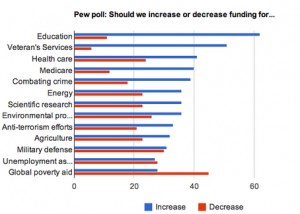
On Wednesday, Republican House leaders introduced $32 billion in budget cuts for the remaining seven months of the 2011 fiscal year, but were then rebuked by more conservative members who deemed the cuts not deep enough. A big chunk of the incoming freshman class, elected on the promise of slashing $100B from the budget, are taking their campaign promise literally.
This creates problems for Speaker Boehner and his team who have vowed not to repeat the mistakes of the ill-fated 1995 Gingrich Congress who played a game of “chicken” over the budget and lost. Boehner is faced with internal forces who are demanding extremely painful non-defense discretionary spending cuts. Meanwhile, a new Pew Poll shows that most Republican constituents are not in favor of cutting much other than global aid and unemployment benefits. This potentially puts the House leadership in a no-win situation.
The poll shows that while the American people are conceptually in favor of less spending, lower taxes, and smaller government, when you get down to specifics, there’s not too much they are willing to give up in terms of government services and programs. There is a popular perception that government is so rife with waste and fraud that $100B could be saved without really impacting anyone’s life. A false perception that was perpetrated by the GOP during the 2010 election when they tossed the $100B number about without any specific plan for how to achieve it.
Unfortunately for the GOP, many of their own members were drinking their Kool-Aid. The Tea Party Caucus and other ultra-fiscal conservatives are now standing by their $100B pledge. And they seem convinced that this time around the people would stand with them if they dare the Senate and Obama to reject their cuts—something House leaders are not so sure about.
With a looming budget vote and a debt ceiling vote, fiscal conservatives have two upcoming opportunities to force an economic crisis if they are unsatisfied with the budget proposals. Neither a government shutdown due to a failure to approve a budget nor the global market shockwave that a refusal to raise the debt ceiling would cause will be tolerated by voters. Yet there is virtually no chance a draconian budget approved by the House would get through the Democratically controlled Senate, much less the White House. Even if it did, the poll indicates a significant voter backlash.
Unless the fiscal conservatives blink, the only path to avoid a crisis may be for moderate Republicans to break ranks with the Tea Party and cooperate with Democrats to pass reasonable budget bills. This is something neither Boehner nor the Republican party wish to happen as it would fracture the unified alliance responsible for resurrecting the party after 2006 and would alienate the conservative base.
The GOP is between the proverbial rock and a hard place. Yet it’s hard to sympathize as this is a situation of their own making. It’s not clear if Republicans will win or lose, but it’s increasingly likely the people will lose.
